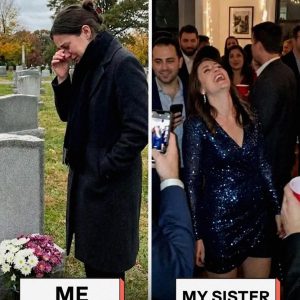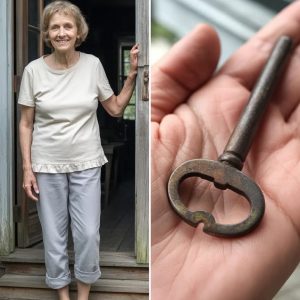I knew something was wrong the second I heard Ezra’s voice. It sounded far away, like he was calling through fog. “Please… just come,” he said, and the line went dead.
I grabbed my keys and drove to his childhood home—the one he’d barely set foot in since his mother quietly transferred it to his sister, Rina. Years ago, his mom had promised everything would be “evenly divided,” sweet as spun sugar. Then she sold her late husband’s business, shifted the accounts, and handed the whole estate—house, stocks, cash—to Rina, the daughter who treated love like a vending machine and her mother like a lifetime refill.
Now the well had run dry, and she wanted us to fill it.
When she’d shown up last week with a yellow notepad and a list of “needs,” I told her no. Calmly. Firmly. “We’re planning for our kids’ college. You made your choices.” She exploded—“You ungrateful brats will regret it!”—and I called her bluff.
Standing in her living room now, that bluff didn’t feel like a bluff at all. Ezra’s face was ash-pale, eyes red. He pointed to a stack of envelopes spread across the coffee table like a paper autopsy: bank statements in the red, foreclosure notices, final demands from creditors. A note beneath them, handwritten and shaky.
“She remortgaged the house,” Ezra said, voice scraping. “Rina co-signed. Then disappeared.”
The note undid him. It wasn’t a will or a plan—just an apology, a confession that she’d made mistakes, and a line that made my stomach drop: “I’m going away for a while.”
We called the police. Filed a missing person report. Then we waited. Ezra stopped sleeping, barely ate. I put on a brave face for our kids and kept failing at it.
On day four, they found her. Alive. In a cheap motel two towns over, sitting on a bed with a small bag of clothes and that same budget notepad clutched in her hands like a life jacket. They said it wasn’t a full break, but close—exhaustion braided with shame.
Rina had blocked her. No answer. No help. No “golden child” glow without the gold.
Ezra brought his mom to our house—not because he wanted to reward her, but because there was nowhere else. I hated it at first. I didn’t want our kids around the chaos that always followed her. But when I saw her in the guest room—smaller than I remembered, shoulders caved in—I felt something shift. This wasn’t a villain. This was a woman who had mistaken bribery for love, then watched the only person she’d ever successfully bribed walk away.
One night, Ezra asked the question that had been corroding him for years. “Why was I always the backup plan?”
She looked at him like he was someone she was just now seeing clearly. Tears gathered. “Because you didn’t need me to love you. You already loved me.” Twisted, yes. But in her logic, Rina was fragile and needed attention to function, and Ezra was the son who forgave her, the one she could neglect without losing.
He cried that night. It wasn’t a collapse; it was a release. He finally stopped waiting for the mother he wanted and accepted the one he had.
We made a plan. We wouldn’t fund her retirement. We would not be a replacement ATM. But we would help her stabilize. Three months in our home to find a subsidized senior apartment. A financial counselor to triage the debt. She’d sell her car. We’d set ground rules: no guilt trips, no entitlement, no end runs around boundaries.
She surprised us by sticking to them.
She started small. Folding laundry. Stirring soup. Reading to our youngest. She joined a community center and, to everyone’s amazement, took a painting class. We had never seen this part of her—quiet, focused, steady.
One afternoon, she sat beside me while I matched socks. “I know you hate me,” she said.
“I don’t,” I told her. “I hated what you did. That’s different.”
She nodded like someone finally told her the price in plain numbers. Then she said she’d spent her life chasing the child who demanded proof and ignoring the child who gave love without asking. She didn’t ask for forgiveness. She asked for a chance to behave like someone worthy of it.
Rina never called. Never visited. We eventually heard she’d moved states with a man she’d just met; that lasted about as long as a warranty on a toaster. Months later, she texted to ask if her mother still had a particular necklace—“need cash.” For the first time in recorded history, her mother told her no.
It didn’t fix the past, but it bent the future.
Three months stretched to six while the paperwork ground on. On move-in day at the senior apartment, she handed Ezra a small envelope. Inside was a painting she’d made: all of us under a wide green tree—Ezra, me, our kids, and her, painted not at the edge, but in the circle. On the back she’d written, It’s never too late to be part of something real.
We hung it in the hallway.
It was not a flawless redemption arc. There were missteps, old reflexes that bubbled up—little barbs dressed as jokes, the occasional sigh that sounded like a bill coming due. But she corrected herself. She apologized without prompting. She went to that art class every week and, quietly, to a support group for seniors with estranged families.
Years later, when she passed, we found a letter in her nightstand addressed to us. She thanked us—not for money we never gave—but for the boundary that didn’t abandon her. She admitted she’d spent decades bargaining with guilt and fear, calling it love. “My last chapter,” she wrote, “was my favorite.”
A volunteer from the community center told us more. Our mother-in-law had told her story to the group—about favoritism, about enabling, about the cliff at the end of a one-way road. Because she kept showing up, others reached out to their children. Not everyone reconciled. But more than a few started again, slowly, clumsily, honestly.
“She said her son and daughter-in-law saved her soul, not her life,” the volunteer said.
That line settled into us like a true thing you wish you’d known sooner.
We never funded her retirement. We never became the safety net she expected. But we also didn’t let her drown. We drew a line, then stood on our side of it with our hands out. She chose to walk toward us. That part—the choosing—was always the missing piece.
People can change. Not because we push hard enough, but because, given a boundary and a little light, they decide to turn. Love isn’t rescue. It’s space and steadiness and the nerve to say “no” and “I’m here” in the same breath.
If you’re walking something like this, I hope you hear what we learned: you can refuse to be used and still refuse to be cruel. You can protect your family and leave the door open to better. Broken isn’t the same as beyond repair. Sometimes, the most loving thing you can offer is a boundary—and the chance to build a different ending from there.





